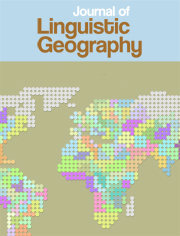Crossref Citations
This article has been cited by the following publications. This list is generated based on data provided by
Crossref.
Álvarez-Mosquera, Pedro
and
Marín-Gutiérrez, Alejandro
2019.
A sociolinguistic approach to implicit language attitudes towards historically white English accents among young L1 South African indigenous language speakers.
International Journal of the Sociology of Language,
Vol. 2019,
Issue. 260,
p.
131.
Rosseel, Laura
Speelman, Dirk
and
Geeraerts, Dirk
2019.
The relational responding task (RRT): a novel approach to measuring social meaning of language variation.
Linguistics Vanguard,
Vol. 5,
Issue. s1,
Rosseel, Laura
and
Grondelaers, Stefan
2019.
Implicitness and experimental methods in language variation research.
Linguistics Vanguard,
Vol. 5,
Issue. s1,
Rosseel, Laura
Speelman, Dirk
and
Geeraerts, Dirk
2019.
Measuring language attitudes in context: Exploring the potential of the Personalized Implicit Association Test.
Language in Society,
Vol. 48,
Issue. 3,
p.
429.
2020.
Soziolinguistische Bibliographie europäischer Länder für 2018Sociolinguistic Bibliography of European Countries for 2018Bibliographie sociolinguistique des pays européens pour 2018.
Sociolinguistica,
Vol. 34,
Issue. 1,
p.
277.
Weirich, Melanie
Jannedy, Stefanie
and
Schüppenhauer, Gediminas
2020.
The Social Meaning of Contextualized Sibilant Alternations in Berlin German.
Frontiers in Psychology,
Vol. 11,
Issue. ,
Roberts, Gillian
2020.
Language attitudes and L2 pronunciation.
English Text Construction,
Vol. 13,
Issue. 2,
p.
178.
Vari, Judit
and
Tamburelli, Marco
2021.
Accepting a “New” Standard Variety: Comparing Explicit Attitudes in Luxembourg and Belgium.
Languages,
Vol. 6,
Issue. 3,
p.
134.
Seghers, Mathias
De Clerck, Bernard
and
Lybaert, Chloé
2021.
When form deviates from the norm: attitudes towards old and new vernacular features and their impact on the perceived credibility and usefulness of Facebook consumer reviews.
Language Sciences,
Vol. 87,
Issue. ,
p.
101413.
Zenner, Eline
Rosseel, Laura
and
Speelman, Dirk
2021.
Starman or Sterrenman: An acquisitional perspective on the social meaning of English in Flanders.
International Journal of Bilingualism,
Vol. 25,
Issue. 3,
p.
568.
Álvarez-Mosquera, Pedro
and
Marín-Gutiérrez, Alejandro
2021.
Language, race or place? Influential factors in determining young “Coloured” individuals’ attitudes towards Afrikaans accents in English.
Lingua,
Vol. 251,
Issue. ,
p.
103027.
Dekker, S. V.
Duarte, J.
and
Loerts, H.
2021.
‘Who really speaks like that?’ – Children’s implicit and explicit attitudes towards multilingual speakers of Dutch.
International Journal of Multilingualism,
Vol. 18,
Issue. 4,
p.
551.
Rombouts, Ellen
Fieremans, Myrthe
and
Zenner, Eline
2023.
‘Talking Very Properly Creates Such a Distance’: Exploring Style‐Shifting in Speech‐Language Therapists.
International Journal of Language & Communication Disorders,
Vol. 58,
Issue. 5,
p.
1680.
Vari, Judit
and
Tamburelli, Marco
2023.
Standardisation: bolstering positive attitudes towards endangered language varieties? Evidence from implicit attitudes.
Journal of Multilingual and Multicultural Development,
Vol. 44,
Issue. 6,
p.
447.
Callesano, Salvatore
and
Carter, Phillip M.
2023.
Unidirectional language bias: The Implicit Association Test with Spanish and English in Miami.
International Journal of Bilingualism,
Vol. 27,
Issue. 6,
p.
960.
Declercq, Christophe
2024.
The Palgrave Handbook of Multilingualism and Language Varieties on Screen.
p.
479.
Jurado-Bravo, María Ángeles
2024.
Foreign accent identification, prototypicality, and lectometric methods.
Cognitive Linguistic Studies,
Vol. 11,
Issue. 1,
p.
180.
Ladegaard, Hans J.
and
Chan, Ka Long Roy
2024.
The importance of suprasegmental features in language attitude research: evidence from a study of teachers’ attitudes towards Hong Kong English.
Journal of Multilingual and Multicultural Development,
p.
1.
Ianos, Maria Adelina
Hinostroza-Castillo, Ursula
Senar, Fernando
and
Petreñas, Cristina
2024.
Predicting language use in Catalonia (Spain): the role of implicit and explicit language attitudes.
International Journal of Multilingualism,
Vol. 21,
Issue. 3,
p.
1419.
McKenzie, Robert M.
McCarty, Kristofor
and
Huang, Mimi
2025.
Implicit and explicit linguistic biases: The influence of social dominance orientation (SDO) upon hierarchical language attitudes.
Lingua,
Vol. 319,
Issue. ,
p.
103928.


